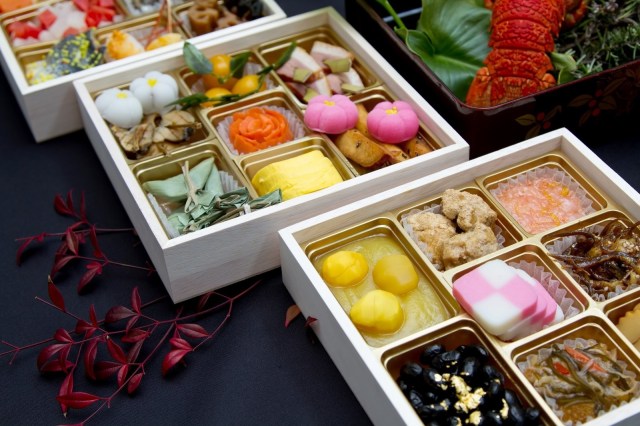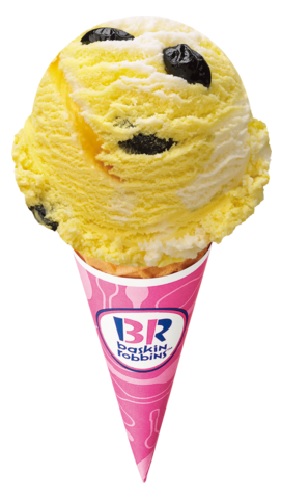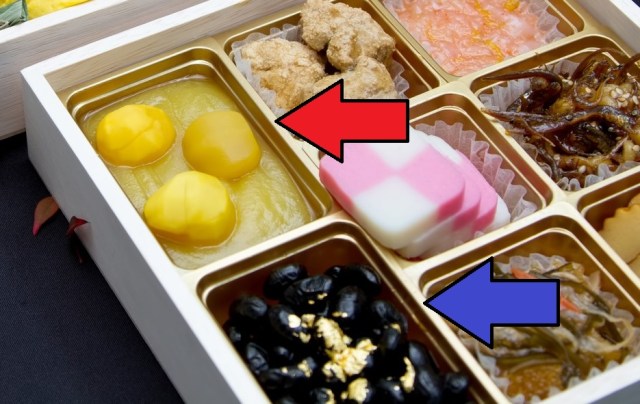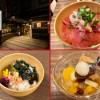
Two of the few osechi dishes almost everyone likes team up for a very special, very Japanese flavor that promises good luck in the new year.
In Japan, the tradition is to celebrate the start of the new year by eating osechi. Pictured above, osechi is a lavish spread of painstakingly prepared delicacies with luxurious ingredients. What’s more, pretty much every dish has some sort of auspicious significance in either its name or its appearance.
Well, that’s the tradition, anyway. In practice, though, a lot of Japanese people, particularly in younger age groups, feel no regret about skipping osechi. It’s difficult and time-consuming to make, extremely pricey to buy pre-made, and to most modern palates, the flavors simply aren’t appealing enough to warrant all the effort and expense.
But again, osechi is a multi-dish meal, and certain types are consistent crowd pleasers, and so Baskin-Robbins Japan has taken two of the most popular types of osechi as the inspiration for a brand-new osechi ice cream.
The Kuromame Kinton Vanilla is a frozen dessert reimaging of kuromame and kurikinton. Kuromame (literally “black beans”) is sweet dish of simmered beans, while kurikinton is a dish of candied chestnuts and sweet potato.
▼ Kurikinton (red arrow) and kuromame (blue arrow), made extra-special with flecks of gold
Baskin-Robbins’ carries that over with a mixed chestnut, sweet potato, and vanilla ice cream base enhanced with sweet black beans from Hokkaido, Japan’s northernmost prefecture. In terms of granting luck and good fortune, the ice cream checks the same boxes as kuromame and kurikinton too. The mame in kuromame means “bean,” which the ice cream accounts for, but is also the pronunciation of the Japanese word for “perseverance.” Meanwhile, kurikinton’s kuri is chestnut, also part of the new ice cream flavor, and kin means both “yellow” (which is the ice cream’s color) and “wealth,” symbolizing prosperity in the new year.
Kuromame Kinton Vanilla goes on sale December 26 and should be sticking around for at least the early part of January. Oh, and if you really want to adhere to tradition, remember that you’re supposed to eat osechi for your meals from January 1 to 3, so you now have a genuine cultural excuse start off 2021 by eating ice cream three days in a row.
Source: PR Times via Entabe
Top image: Pakutaso
Insert images: PR Times, Pakutaso (edited by SoraNews24)
● Want to hear about SoraNews24’s latest articles as soon as they’re published? Follow us on Facebook and Twitter!




 Sakura-flavored ice cream returns to Baskin Robbins in Japan after 24 years!
Sakura-flavored ice cream returns to Baskin Robbins in Japan after 24 years! Baskin-Robbins teams up with Japan’s oldest department store for brand-new traditional ice cream flavor
Baskin-Robbins teams up with Japan’s oldest department store for brand-new traditional ice cream flavor Baskin-Robbins Japan gets extra-Japanese with new kanmidokoro-inspired flavors and sundaes
Baskin-Robbins Japan gets extra-Japanese with new kanmidokoro-inspired flavors and sundaes Lactic acid bacteria Pikachu ice cream and Poké Ball ice cream cake appear at Baskin-Robbins Japan
Lactic acid bacteria Pikachu ice cream and Poké Ball ice cream cake appear at Baskin-Robbins Japan Baskin Robbins Japan extends sales of its Happiness Box ice cream set due to popular demand
Baskin Robbins Japan extends sales of its Happiness Box ice cream set due to popular demand Starbucks Japan unveils new sakura cherry blossom collection for hanami season 2026
Starbucks Japan unveils new sakura cherry blossom collection for hanami season 2026 One Piece creator has hidden secret of anime treasure’s identity in chest at bottom of real-world ocean
One Piece creator has hidden secret of anime treasure’s identity in chest at bottom of real-world ocean Is Tokyo Station’s startlingly expensive wagyu bento boxed lunch worth its high price?[Taste test]
Is Tokyo Station’s startlingly expensive wagyu bento boxed lunch worth its high price?[Taste test] Tokyo street sweets: The must-snack treats of Nakano’s Refutei
Tokyo street sweets: The must-snack treats of Nakano’s Refutei All-you-can-eat sashimi from Tokyo’s fish market, convenient location make this budget hotel great
All-you-can-eat sashimi from Tokyo’s fish market, convenient location make this budget hotel great The deluxe disappointment and basic brilliance of Japan’s oldest standing soba noodle chain
The deluxe disappointment and basic brilliance of Japan’s oldest standing soba noodle chain Make your “miracle romance” come true with this anime-inspired Sailor Moon ring
Make your “miracle romance” come true with this anime-inspired Sailor Moon ring Pizza Hut Japan’s hot lucky bags are perfect for a New Year’s pizza party
Pizza Hut Japan’s hot lucky bags are perfect for a New Year’s pizza party The best Hobonichi diaries, covers and stationery for 2026
The best Hobonichi diaries, covers and stationery for 2026 Viral Japanese cheesecake from Osaka has a lesser known rival called Aunt Wanda
Viral Japanese cheesecake from Osaka has a lesser known rival called Aunt Wanda Starbucks Japan releases first-ever Hinamatsuri Girls’ Day Frappuccino
Starbucks Japan releases first-ever Hinamatsuri Girls’ Day Frappuccino Japanese restaurant chain serves Dragon Ball donuts and Senzu Beans this spring
Japanese restaurant chain serves Dragon Ball donuts and Senzu Beans this spring Japan Extreme Budget Travel! A trip from Tokyo to Izumo for just 30,000 yen [Part 1]
Japan Extreme Budget Travel! A trip from Tokyo to Izumo for just 30,000 yen [Part 1] Highest Starbucks in Japan set to open this spring in the Tokyo sky
Highest Starbucks in Japan set to open this spring in the Tokyo sky Japan’s craziest burger chain takes menchi katsu to new extreme levels
Japan’s craziest burger chain takes menchi katsu to new extreme levels Japan Extreme Budget Travel! A trip from Tokyo to Izumo for just 30,000 yen [Part 2]
Japan Extreme Budget Travel! A trip from Tokyo to Izumo for just 30,000 yen [Part 2] Japan has only one airport named after a samurai, so let’s check out Kochi Ryoma【Photos】
Japan has only one airport named after a samurai, so let’s check out Kochi Ryoma【Photos】 Japanese drugstore sells onigiri at pre-stupid era prices, but how do they compare to 7-Eleven?
Japanese drugstore sells onigiri at pre-stupid era prices, but how do they compare to 7-Eleven? Which convenience store onigiri rice balls are the most popular? Survey reveals surprising results
Which convenience store onigiri rice balls are the most popular? Survey reveals surprising results Japan’s newest Shinkansen has no seats…or passengers [Video]
Japan’s newest Shinkansen has no seats…or passengers [Video] Starbucks Japan releases new sakura goods and drinkware for cherry blossom season 2026
Starbucks Japan releases new sakura goods and drinkware for cherry blossom season 2026 Foreigners accounting for over 80 percent of off-course skiers needing rescue in Japan’s Hokkaido
Foreigners accounting for over 80 percent of off-course skiers needing rescue in Japan’s Hokkaido Super-salty pizza sends six kids to the hospital in Japan, linguistics blamed
Super-salty pizza sends six kids to the hospital in Japan, linguistics blamed Starbucks Japan unveils new sakura Frappuccino for cherry blossom season 2026
Starbucks Japan unveils new sakura Frappuccino for cherry blossom season 2026 Foreign tourists in Japan will get free Shinkansen tickets to promote regional tourism
Foreign tourists in Japan will get free Shinkansen tickets to promote regional tourism The 10 most annoying things foreign tourists do on Japanese trains, according to locals
The 10 most annoying things foreign tourists do on Japanese trains, according to locals Take a trip to Japan’s Dododo Land, the most irritating place on Earth
Take a trip to Japan’s Dododo Land, the most irritating place on Earth Naruto and Converse team up for new line of shinobi sneakers[Photos]
Naruto and Converse team up for new line of shinobi sneakers[Photos] Is China’s don’t-go-to-Japan warning affecting the lines at a popular Tokyo gyukatsu restaurant?
Is China’s don’t-go-to-Japan warning affecting the lines at a popular Tokyo gyukatsu restaurant? Survey asks foreign tourists what bothered them in Japan, more than half gave same answer
Survey asks foreign tourists what bothered them in Japan, more than half gave same answer Japan’s human washing machines will go on sale to general public, demos to be held in Tokyo
Japan’s human washing machines will go on sale to general public, demos to be held in Tokyo Starbucks Japan releases new drinkware and goods for Valentine’s Day
Starbucks Japan releases new drinkware and goods for Valentine’s Day We deeply regret going into this tunnel on our walk in the mountains of Japan
We deeply regret going into this tunnel on our walk in the mountains of Japan Studio Ghibli releases Kodama forest spirits from Princess Mononoke to light up your home
Studio Ghibli releases Kodama forest spirits from Princess Mononoke to light up your home Major Japanese hotel chain says reservations via overseas booking sites may not be valid
Major Japanese hotel chain says reservations via overseas booking sites may not be valid Put sesame oil in your coffee? Japanese maker says it’s the best way to start your day【Taste test】
Put sesame oil in your coffee? Japanese maker says it’s the best way to start your day【Taste test】 No more using real katana for tourism activities, Japan’s National Police Agency says
No more using real katana for tourism activities, Japan’s National Police Agency says Baskin Robbins Japan accepting pre-orders for Kagami Mochi Ice Cream Cakes
Baskin Robbins Japan accepting pre-orders for Kagami Mochi Ice Cream Cakes Baskin Robbins’ new year lucky bags are Snoopy-tastic! (Also, free ice cream!)
Baskin Robbins’ new year lucky bags are Snoopy-tastic! (Also, free ice cream!) Baskin Robbins Japan releases eye-catching Monsters University ice cream cake
Baskin Robbins Japan releases eye-catching Monsters University ice cream cake Sheep-flavored ice cream from Baskin Robbins Japan tastes like dreams
Sheep-flavored ice cream from Baskin Robbins Japan tastes like dreams Baskin Robbins’ Halloween ice cream treats are chillingly adorable
Baskin Robbins’ Halloween ice cream treats are chillingly adorable Pokémon ice cream cakes and Pikachu-flavor ice cream on the menu at Baskin-Robbins Japan!
Pokémon ice cream cakes and Pikachu-flavor ice cream on the menu at Baskin-Robbins Japan! Ring in the New Year with Baskin-Robbins Japan’s adorable Pokémon ice cream dishes
Ring in the New Year with Baskin-Robbins Japan’s adorable Pokémon ice cream dishes New Pokémon ice cream, dessert drinks, and cool merch coming to Baskin-Robbins Japan【Pics】
New Pokémon ice cream, dessert drinks, and cool merch coming to Baskin-Robbins Japan【Pics】 【Lucky Bag Roundup 2018】Baskin Robbins combines ice cream with Snoopy for New Year in Japan
【Lucky Bag Roundup 2018】Baskin Robbins combines ice cream with Snoopy for New Year in Japan Japan’s Slime ice cream will Heal you since it’s a Dragon Quest tie-up with Baskin-Robbins Japan
Japan’s Slime ice cream will Heal you since it’s a Dragon Quest tie-up with Baskin-Robbins Japan Super Mario and Baskin-Robbins release a power-up ice cream collection in Japan
Super Mario and Baskin-Robbins release a power-up ice cream collection in Japan Does the new Godiva x Baskin-Robbins Japan ice cream collaboration live up to the hype?
Does the new Godiva x Baskin-Robbins Japan ice cream collaboration live up to the hype? Baskin-Robbins Japan creates four-cheese pizza ice cream – Buono or non buono?【Taste test】
Baskin-Robbins Japan creates four-cheese pizza ice cream – Buono or non buono?【Taste test】 Two brand-new Pokémon ice cream flavors arrive at Baskin-Robbins Japan with summertime extras
Two brand-new Pokémon ice cream flavors arrive at Baskin-Robbins Japan with summertime extras Baskin Robbins Japan pinpoints the flavors of love in time for Valentines Day
Baskin Robbins Japan pinpoints the flavors of love in time for Valentines Day Baskin Robbins introduces a limited-edition ice cream to celebrate the boys of summer
Baskin Robbins introduces a limited-edition ice cream to celebrate the boys of summer 【Lucky Bag Roundup 2017】Baskin Robbins delights with a Happy Bag of ice cream-themed goods
【Lucky Bag Roundup 2017】Baskin Robbins delights with a Happy Bag of ice cream-themed goods